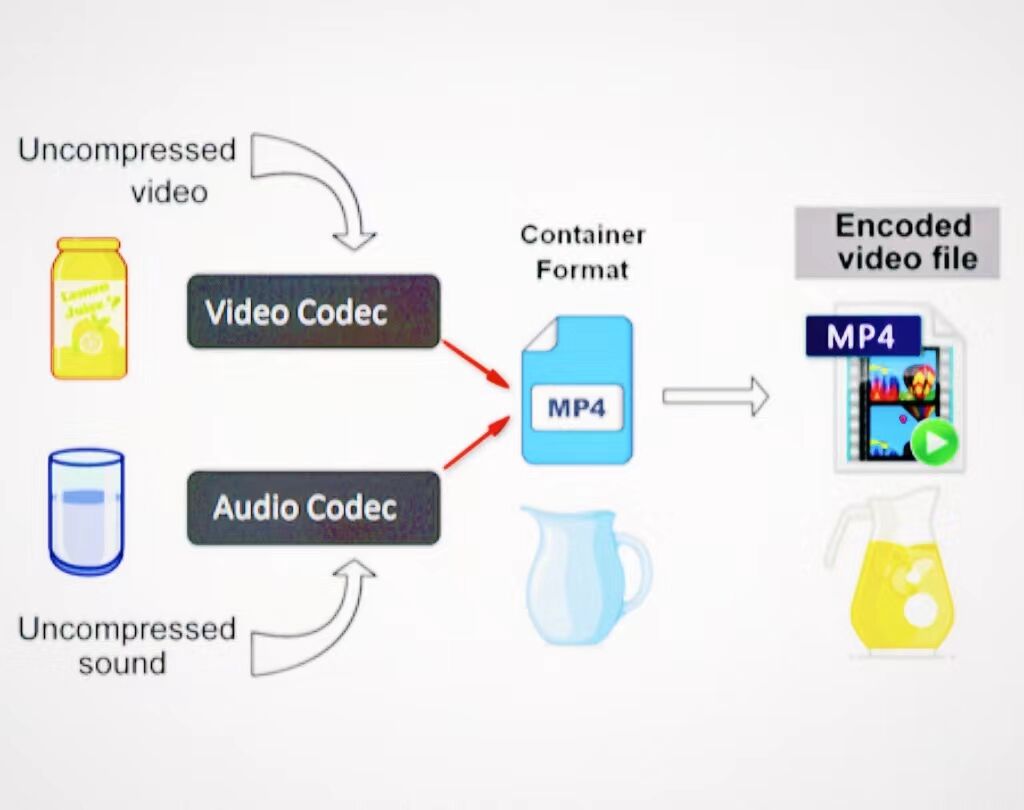H.264 VS H.265 : The difference And How to choice | Sinoseen
With the increasing popularity of video, video playback technology has evolved considerably, and the H.264 and H.265 video compression standards are among the best.
We often compare H.264 vs H.265. Even though the end goal of compressing and decompressing video data is the same for both.
So, in this battle of H264 vs H265, who is dominating which side? In this article, we will look at comparing these two codecs and analyze which one best suits your needs.
Additionally, we'll explore the key aspects of HEVC vs H264.
Why do we need Video Encoding?And What is Video Codec?
Before learning more about h264 vs h265 which is better h, let's first understand the video encoding and codecs.
Simply put, video encoding is the process of compressing video, reducing the need for transmission bandwidth and storage space. We all know that video is composed of images. Take a video with a resolution of 1920*1080 and a frame rate of 30 frames (fps) for example. Without video encoding, the bandwidth for one second of that video would be a staggering 1.4 GB. It's easy to see that video contains a lot of information that is far beyond the capabilities of today's networks, so video compression and encoding is critical for transmitting video over the network while saving transmission bandwidth and storage space.
Video codecs are a great solution to this problem, making video files smaller and better while fixing the errors and glitches that occur when shrinking a video file to make him look smoother.
There are many video codecs out there, and one of the most popular is h.264 avc vs h.265 hevc, which is used by many video websites.Understanding the nuances of hevc vs h264 is essential in today's video landscape.
What does H.264 vs. H.265 mean?
Now let's understand what the two terms H.264 vs. H.265 mean.
What Is the H.264 (AVC)?
H.264, also known as MPEG-4 Part 10 or AVC (Advanced Video Coding), is a video compression standard developed by the Joint Video Team (JVT), a collaboration between the International Telecommunication Union (ITU-T) and the International Organization for Standardization (ISO/IEC).is a widely adopted video codec known for its efficiency and versatility. It utilizes sophisticated compression algorithms to reduce the size of video files without sacrificing quality.H.264 codec is achieve significantly reduced bitrate compared to its forerunner and remains in use across various streaming sources.This makes the hevc vs h264 comparison quite interesting.
What Is the H.265(HEVC)?
H.265 represents the advanced iteration of H.264, alternatively also known as High Efficiency Video Coding (HEVC).represents a significant advancement in video compression technology. It offers improved compression efficiency, enabling higher quality video at lower bitrates.HEVC also demands higher computational power for effective data compression.
What are the Difference between H.264 vs. H.265?
Although h264 vs h.265 both offer higher quality and smaller file sizes, there are subtle differences between the two.Let's delve into the specifics of h264 vs h265.
Video Quality
H.264 and H.265 codecs exhibit significant disparities in video quality at equivalent bitrates.While H.264 provides excellent video quality, H.265 can deliver even higher-quality video, especially at resolutions beyond 1080p. This makes H.265 the preferred choice for delivering 4K and 8K video content without sacrificing visual fidelity.The debate of hevc vs h264 often highlights this quality difference.

Compression Efficiency
The degree to which a codec compresses digital videos directly influences the resulting file size for transmission or streaming.h.265 boasts enhanced compression algorithms, resulting in significantly smaller file sizes than its predecessor, H.264.offering up to 50% reduction in file size for the same video quality. This makes H.265 particularly advantageous for applications where storage space or bandwidth is limited.This is a major win for H.265 in the h264 vs h265 debate.
Device and Platform Compatibility
Before opting for either of these codecs, it’s important to understand their compatibility across devices and platforms.In the realm of compatibility, H.265 surpasses H.264 but it lags behind it in popularity. However, H.265 support is rapidly increasing, with more and more devices, including smartphones, tablets, and TVs, incorporating hardware-accelerated decoding capabilities.When considering hevc vs h264, compatibility remains a crucial factor.
Licensing and Royalties
There is a single patent licensing for the AVC, or H. 265 codec. On the other hand, HEVC has four: Among these participating companies are the HEVC Advance, MPEG LA, Velos Media, and Technicolor. This truth is the main obstacle to the expansion of H. 265 adoption and it drives up the cost of using this type of codec.This licensing structure heavily influences the widespread adoption of H.265 when comparing h264 vs h265.
Now, let's go back to the previous topic, is h.265 better than h.264? Below is the comparison table of hevc to avc:
|
|
H.265 |
H.264 |
|
Supported formats |
mxf, ps, ts, 3gp , mkv, mp4, qtff, asf, avi |
m2ts, evo, 3gp, f4v, mkv, mp4, qtff, asf, avi, mxf, ps, ts |
|
storage space |
Requires lesser space than H264 |
more space |
|
patents |
Complicated adoption due to 4 patent licensing |
Easy adoption due to single patent licensing |
|
Scope of Application |
- Blu-ray disks. - Streaming digital videos from YouTube, Vimeo, etc. |
- Widely used for streaming across various platforms. - Common in older devices and many consumer cameras. |
|
Supported Browsers |
- Supported by Safari (on Apple devices) - Supported by all major browsers except Firefox (may require hardware support) |
- Supported by all major browsers |
Changing the Landscape of Video Technology: AV1
AV1, or AOMedia Video 1, is an open, royalty-free video coding format designed for internet video streaming and related applications. It was developed by the Alliance for Open Media (AOMedia), a consortium that includes companies like Google, Amazon, Netflix, Microsoft, and others. AV1 aims to provide improved compression efficiency over existing video codecs, such as H.264 and VP9, while maintaining high visual quality.AV1 better compression efficiency than H.265, and it also addresses the patent and licensing issues associated with it.This further complicates the long-term outlook for hevc vs h264.
is hevc better than h264?which should i choice?
Overall, h.264 to h.265 each has its own advantages. Which one to choose depends on the needs of the video.The debate of h264 vs h265 doesn't have a single answer.
H.265 is superior to H.264 when considering only performance, and H.265/HEVC offers a wider range of bitrate reduction tools than H.264/AVC.But if broad compatibility and efficient processing power are essential, H.264 is a better option.When evaluating hevc vs h264 for a specific project, these trade-offs are key.
h264 or hevc:which is better for unraid camera?
For camera modules, H.264 support means the ability to record high-quality video and achieve good visual quality while keeping file sizes relatively low.
Many consumer-grade cameras, camcorders, and mobile devices support H.264, so video encoded using H.264 can often be widely played and shared across a variety of devices and platforms.
And H.265 means it's possible to record video for longer periods of time with the same amount of storage space, or with higher picture quality for the same amount of recording time.
Because H.265 can significantly reduce file size while maintaining visual quality, it is especially suited for applications that need to record long periods of video in limited storage space, such as surveillance cameras, drones, and more.
So, when considering h264 vs h265 for surveillance, H.265 often wins for storage efficiency. The hevc vs h264 choice depends on your camera's capabilities and storage needs.
So, which codec do you prefer?

Industry Adoption and Future Trends
The adoption of H.264 and H.265 has been largely driven by industry needs and technological advancements. H.264 remains the most widely used video compression standard, with widespread support across a vast array of devices and platforms. However, the increasing demand for higher-quality video and the need for more efficient compression has led to a growing adoption of H.265, especially in emerging applications such as 4K and 8K video streaming, virtual reality, and advanced video conferencing.The ongoing evolution in the hevc vs h264 landscape continues to shape how we consume video.
FAQ:
Are there any licensing fees associated with using H.265 (HEVC)?
Yes, there are licensing fees associated with using H.265 (HEVC). HEVC is covered by patents owned by various entities, and the use of the technology requires licensing agreements with these patent holders.This is a key differentiator in the h264 vs h265 discussion.
Can I convert H.265 (HEVC) videos to H.264 (AVC) format?
Yes, it is possible to convert H.265 videos to H.264 format using video conversion software or online converters. But the conversion process may lead to some quality loss because the compression efficiency of H.264 is not as good as H.265.The conversion often highlights the differences in compression between hevc vs h264.
Which Is More Suitable For Video Editing, H.264 or H.265?
H.265 is better for video editing because it offers superior data compression efficiency. This means you can significantly reduce file sizes when importing and exporting.For professional workflows, the benefits of H.265 in the h264 vs h265 comparison are often clear.

 EN
EN
 AR
AR
 DA
DA
 NL
NL
 FI
FI
 FR
FR
 DE
DE
 EL
EL
 HI
HI
 IT
IT
 JA
JA
 KO
KO
 NO
NO
 PL
PL
 PT
PT
 RO
RO
 RU
RU
 ES
ES
 SV
SV
 TL
TL
 IW
IW
 ID
ID
 SR
SR
 VI
VI
 HU
HU
 TH
TH
 TR
TR
 FA
FA
 MS
MS
 IS
IS
 AZ
AZ
 UR
UR
 BN
BN
 HA
HA
 LO
LO
 MR
MR
 MN
MN
 PA
PA
 MY
MY
 SD
SD















